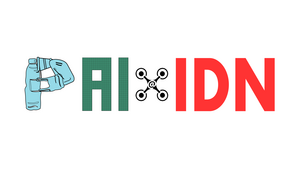Recent research shows that Indonesian rivers are among the most polluted in the world. In response, the Indonesian government has launched the Indonesian’s Plan of Action for Combating Marine Debris, which aims to reduce marine plastic litter by 70% by 2025. To meet the Indonesian government's goal of reducing plastic litter in the ocean by 2025, information on plastic litter and innovative methods to monitor the litter are also needed. Information on quantities and types of plastic waste at major discharge sites is required.
To obtain information about these different plastic types and waste quantities, the DFKI Marine Perception research group is working on evaluation using artificial intelligence to assess these waste characteristics and the locations of the plastic trash. Under this project, a study is being conducted for monitoring plastic litter in rivers and on beaches using drones, which detects plastic litter based on automated detection using artificial intelligence and other methods. This concept is also to enable the government and stakeholders to implement plastic waste monitoring methods through capacity building.
Partners
- Bandung Institute of Technology


